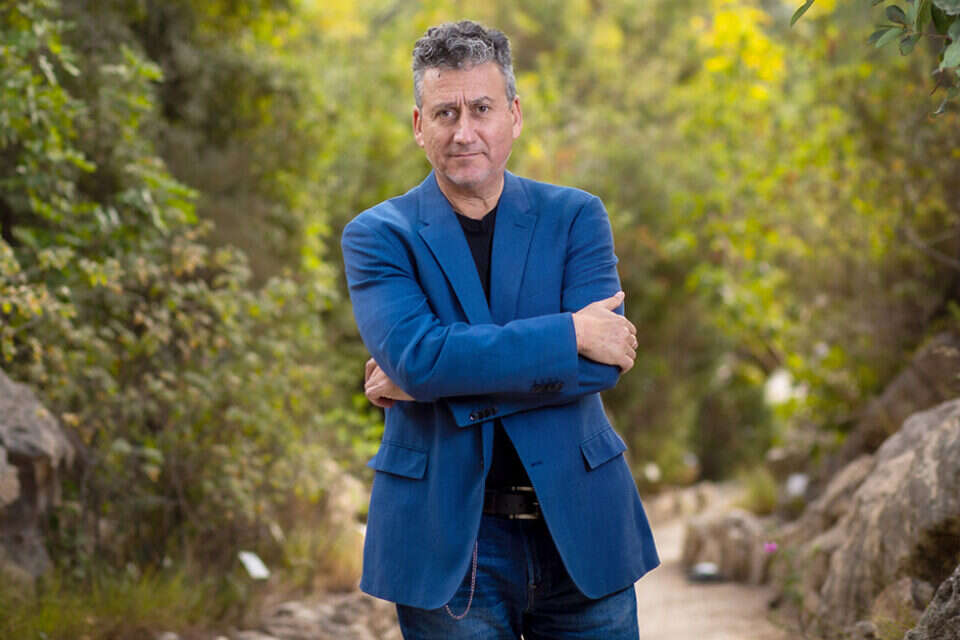Nathan Wasserman has a friend named Hamorbi.
And even though he died about 3,800 years ago, according to Wasserman, he "interests me as a character, he is real to me."
The relationship with the King of Babylon, even if it is active only in imaginations and feelings, is part of Wasserman's passion for the ancient world, and for his lost languages.
"It's a fire that has not stopped burning inside me since childhood, an engine that has not been turned off," he admits.
In contrast to Prof. Nathan Wasserman's constant dialogue with the rulers of the ancient period, the poet Nathan Wasserman hardly speaks or belongs to a clique or group. He is perhaps the most exciting and fascinating poet in Israel in the last decade, and he is also one of the most enigmatic of them all. Although six of his books have been published since the turn of the century, he has never been interviewed for his poetry, until this interview. He does not hold accounts on social networks, and the publications of his songs are not accompanied, as with many of his colleagues, by the backbone of posts and shares. They simply stand on their own, like a salt commissioner over Sodom; Poetic collages in which history and geography are interdependent, compressing countless cultures, universes, spaces and characters into one song.
From Dresden to Ein Gedi; From the Mesopotamian Gilgamesh to the Polish of Abba's house; From Mahmoud Darwish to a waitress at an IDF intelligence base. Everything melts in Wasserman's lyrics into a nucleus of meaning and time. And it seems that even those who did not memorize the odyssey as a child will capture a memory or feeling from the mesmerizing, post-apocalyptic world that he creates.
At the end of it all, it seems, Wasserman writes love songs;
Between spouses, between fathers and sons.
And love songs, though bursting from the four winds of heaven at the same time, permeate distant and foreign souls to each other.
In one of the poems, Menelaus, king of Sparta, is pulled out of mythology and cries inside a vehicle, in a parking lot in the Valley of the Cross;
In another song, a loving couple invades Falkland and Lebanon together, winning battles in Nicaragua and Afghanistan.
"History has progressed by our side, full of piles, transparent as strychnines," Wasserman writes in East Hampton.
"The modern world is a world of melting boundaries or courses, but we are unable to decipher the dimension of time, neither as a culture nor as a technology. That is what fascinates me," he says.
"I'm a mountain explorer, a history that changed the world."
A peg that was discovered in the ancient Sumerian city of Girso in Iraq // Photo: AFP,
"Everyone has suffering"
We meet in a cafe on the top floor of the Jerusalem Theater, within a radius where it runs all its life. He was born in this city in 1962, attended the Agron School and high school near the university. For almost 40 years he has been researching peg writing - mainly from the Akkadian and Sumerian languages - at the Hebrew University, in the Assyrian section of the Department of Archeology and the Ancient Near East.
Wasserman's Jerusalem DNA is deciphered even without an available microscope, evident in poems and contexts, especially in his book "Black and a Star" (Carmel, 2014), a journey in prose conducted by the German-Jewish poet Elsa Lasker-Schiller, who lived in Mandatory Jerusalem and died in 1945. The city, his beloved-hated one, he describes in the book as "a crooked concrete mixer into which scriptures and scriptures are poured out, the revelations of prophets and their stoning, the absence of God and his compactness."
After his military service he worked at the Herbert Stein Bookstore downtown. Stein occasionally asked him what he would like to study at university. "Every time I answered, he rejected the choice on the grounds that 'this is nonsense,'" Wasserman says, "until he sent me to make an appointment with Haim Tadmor."
Prof. Tadmor, who founded the Department of Assurology at the Hebrew University in the 1960s, did not find it difficult to conquer Wasserman with the magic of the ancient languages. "At first I was still thinking of enrolling in classical studies, but I realized that there are people in the world who learn Greek and Latin from the age of 12, and it will be hard for me to stand out in the field. So I went to other languages."
Throughout his years as a researcher, and even before them, he wrote poetry. He published the first poem, he hypothesized, at the age of 11, in the weekly Haaretz Shelnu - but a book was published decades later, at the age of 40, "The Breaker of Bread" (Helicon, 2002). Since then, "Two Years" (2006), "And the World Has No Place" (2011), "Saxony, the Book of the Desert" (2014), and "Menelaus" (2018) have been published. In 2008 he won the Yehuda Amichai Prize for Hebrew poetry, and most recently he won the Haim Guri Prize for Hebrew poetry on behalf of "A Place for Poetry". In the reasons for the award, the jury wrote that Wasserman's poetry is "a fusion between ancient mythologies and history, which creates a new, urban, natural and Jerusalem mythology. It is original, experimental, daring and rare poetry."
He himself did not think of it - why did he see light only at the age of 40? "I've had all sorts of personal upheavals in life, and in any case the biography, in my eyes, is not enough for a work."
The local.
Haim Guri // Photo: Gideon Markovich,
What do you mean?
"I have a great closeness to the poet Israel Pinkas, who is also editing my next book, and he said to me - 'Listen, everyone has a biography.' This is a statement that sounds disparaging, but it is profound. "Biography as the only engine to fly this plane - it characterizes contemporary poetry, and it does not speak to me. The biography, even when it exists, can sometimes be untrue."
You are talking about the gap between honesty and truth. Some people tie them together and ignore the differences.
"Honesty is now becoming a criterion, a single litmus test for the quality of poetry. Above all is the ability of man to take out his pain, his sexual identity, his gender identity. There is a glide of identity politics into writing. And when that happens, I have to hold on well. Myself to keep reading the song.I have no patience for that.
"The biography is not necessarily the truth; the truth is a spiritual quality that should be strived for, if you will - a divine quality. People write songs as footnotes to life, which is completely irrelevant. They get wrong advice about what they find in them. You have reached the mine within, what are you? "Do with it? You have to extract gold from there, not take the lead out. Lead has no value."
"Localism gives enormous power"
In Wasserman's poetry, different universes meet in one line of poetry. And yet the song is effective even for those who do not understand all the contexts. How can this be explained? "In poetry, as in TV commercials, there are complicated and abstract things and you say - wow, that's beautiful. But deep down, what motivates us is emotion," he says. "In music, for example, there is a tremendous power, which there is nothing that competes with, in my opinion, in all muses. I am stuck in the music of the 70s because I grew up on it, and it moves me like nothing else will move. If no emotion emerges from text, some emotion "It's useless.
" Poetry is not a necessity. No need for poetry. What is needed is air conditioners and interceptor missiles and concrete to build buildings. A poem? Do not need. Poetic expression is something that is imprinted in us, probably biologically, and operates within us on a different frequency. And when he hits, he hits hard. "
Nurit Zarchi once said that your poetry "brings the roots with the tree." And it really has a Jewish charge, and very Israeli situations, but on the other hand the consciousness is not committed to anything.
"We can not uproot our roots, but we also can not delineate them. That's what's great about this place, which is complex and conflicted and constantly changing. My mother tongue is generally Polish, I started speaking Hebrew from the education system. But like Haim Guri, I'm old. The place, and there is no question about it. A person taken to a detention camp on the Island of Demons is unlikely to feel like a local. So is a slave transferred from Africa to the cotton fields of Carolina. But this is not our situation. ".
To belong to something great — to place, to spirit, to being — is perhaps the point at which one Wasserman foot stands in the world of research, and a second foot in the world of poetry. For him, the sense of belonging has an advantage over the scientific findings. "I do not disturb anyone to feel connected, and I do not expect anyone to preach to me if I feel connected to the ancient world. The connection is conscious. The Turks see themselves as the successors of the beasts, but what is between them and the beasts? Nothing. Saddam Hussein thought he was the successor of Nebuchadnezzar and "Hamorbi, and I can understand that. His two divisions, which went down south and slaughtered the Shiites, were named after them. And that is when he was in the Ba'ath party, which was originally secular."
He says that students often ask him about our father Abraham, "and I tell them - I know nothing about him except the Bible, and it is wonderful. Suppose they find a grave, find a skull, and say - here is our father Abraham. Will it help us? It will only diminish his power. Abraham is The father of the nation - also for me, who I do not keep mitzvos. I do not want to find out if he was seventy meters or if he had one or the other. It will make me believe more in God? In the story? No.
"
Germany?
She is the most invented of all.
In the south of France lived separate peoples, turned them into French, pushed them into a drawer by force.
With it is a matter of consciousness.
Jews have a clear national genetic component, but that is not the essential thing.
The essence is consciousness.
So Abraham is the father of the nation.
point.
It is as an Athenian says - Athens was founded by Theseus. "
Great closeness.
Israel Pinkas // Photo: Liron Almog,
Get ready for the karate blow
In the Israeli literary field, where publishers publish almost no paid poetry books, and certainly do not invest in the public relations genre, belonging to a group or a clique of poets is almost a necessity, in an attempt to attract attention. Wasserman testifies that he fanatically advocated against the phenomenon, but has since softened a bit, and in recent years he has even edited the journal "Carmel" for poetry.
"There were times when it was done rudely. I was not nice to people," he says, "in retrospect, I feel uncomfortable because I pushed them back assertively." However, he clarifies: "I have no problem speaking and I have no audience fear, but I have a problem with people's self-certification. There is a difference between prose and poetry. In prose, the feeling is that most people's judgment is right about it. But in poetry, it is not always clear What do you do and how do you read? Therefore, many writers start talking about themselves and their work, and this dilutes the powers of poetry. After all, most people speak well of themselves and writers close to them, and self-caressing is wrong in my eyes, "With the necessary difficulties in writing. It is a dilution of the poetic occupation."
What is needed for the pursuit of poetry?
"Like the samurai, who all his life prepares for battle - until there comes one moment when the battle happens - so the poet constantly prepares for the moment when the singing will take place. It should not be made too dramatic - there are also techniques and ability, and sometimes writing out of habit .
He tells of an elderly lady who once studied with him in a university class, who at the beginning of the class told him that she "read a poem in Natan Wasserman's newspaper" and wondered if it was him. "I told her, no-no, there's another Nathan Wasserman. But I soon realized she took it for granted. I did not want to lie to her. Then after a few minutes I told her, yes, it's me. I did not feel comfortable. But in recent years there has been surfing, sweating "Between one tool and another, in terms of my willingness to combine the domains in public."
As a very small fan of the networks, he dislikes academic initiatives to record lecturer classes to create a photocopied teaching pool. "I am a good child of Jerusalem and do what I am told, but there is something devilish about this act. The advantage of teaching lies in its one-time nature, it exists in Judaism significantly, especially in Hasidism - the power of the story once it is told. In teaching there is a moment of enlightenment. , And the student - it could be a Buddhist or a Taoist, in Japan or Mea Shearim - suddenly something opens up in him. And when you record,You're finishing it. "
Maybe it connects to your poetry? In one of your books you liken the story to a snake holding its tail in its mouth. Art possible only out of instability, out of chaos?
"Not only unstable, but even unsettled. While there is great poetry that stems from a sense of security and order, for example the Odyssey, modern poetry needs something unexpected. Like suddenly noticing a window, and looking out through it at a view you did not expect to see. Destroy your house, TMA 38 is being built, and suddenly everything looks different. In my opinion, this is what poetry should do - to bring back wind, to breathe air. "
Do you think poetry seeks to control life? Capture the passing time and frame it?
"It is impossible to grasp life. Death cannot be defeated either, but it makes more sense, ostensibly, to try to control death than to control life. Because controlling life means ending it. If I understand poetry correctly, it tries to go inside, to perceive life as A surfboard on the wave. That's why I'm so drawn to the mythological dimension, which is a kind of mass, or movement of matter, of existence, of being, that is constantly happening. The mythical world is a world of connectivity, and it is on my eye like a cataract. "My virtual reality is a voice that jumps back and forth into the mythical sphere."
A collection of magical spells
There is a gap in Wasserman's body language when he talks about writing poetry, as opposed to discussing the objects of his research.
As we move on to talk about peg writing he relaxes in a chair, feels at home.
What exactly is a peg recorder, and why did he disappear from the world?
"Peg writing has existed for 3,000 years. The last dated text written in this tradition is a year after the fall of Masada, around 70 AD. Usually the writing is done on a board the size of a cigarette box, but there are larger boards. Why did this tradition disappear? "Part of culture. And as soon as the Babylonians stopped being Babylonians and started to be something else, first Hellenists and then Aramaeans and then Arabs, the culture changed and with it the reporter."
So it's not a matter of technology breakthrough?
"No, it's a tradition, because writing and culture are intertwined. It's not that the poor Mesopotamians waited thousands of years, and then, about a thousand BC, they were brought the alphabet and they said, ah-live. Absolutely not. Until this morning, if I read "As far as the Internet is concerned, a country that does not write an alphabet rules the world - its name is China. The Chinese do not think for a moment to change their writing, which is impossible for us."
Today, he says, there are about half a million pegs in museums around the world, "the earliest is from 3,100 BC. We have a disturbing amount of texts." He himself deals with "everything that is literature, by way of negation: no economics, no law and no technical-medical texts. What is it? Myths, prayers, magical spells. I have just written a book about magic to be published in Germany. It is clever and extensive literature, wonderful "I'm close to biblical literature. I'm not a single butterfly researcher who grew up in South Australia; I'm a mountain researcher, a history that changed the world. And I make an effort to make it accessible."
How do you do that?
"It's problematic because it goes back to my snobbish nature, but here, I am soon publishing a book that is a collection of spells from the ancient world, and there are also anthologies of literature from Mesopotamia."
In his column at the university, students count on two palms, maybe three, but he makes it clear that unlike the headlines about the disappearance of the humanities - he encounters a system that understands the importance of the field. "Peg and Assurology studies are very important, and I meet a deep understanding of it. True, Hebrew is close to Akkadian, and we are the land of the Bible, but the truth is that it is because it is rooted in people, officials, that we are used to belittling and angry about. At the university since the 1980s, I do not feel that the field is threatened. "
How many people in the world are involved in your field?
"Like me, hardcore researchers with their hands inside peg boards, there are maybe 200 all over the world. This is a clear reference group. We're like wall climbers, a bit of an Olympic profession where you come to conferences and you recognize - it's Soviet, it's Swedish."
What languages are hiding in your head?
"In the field of research, I mainly deal with Akkadian and Sumerian. In modern languages I get along with Hebrew, English, French, Polish, German. Five languages. Not a great bargain."
And how do the ancient, dead languages fit into our living languages?
"There are many Hebrew words that originate in Akkadian, and of course in the biblical language there are Akkadian words. The word 'city', for example, is a Sumerian word, and it is a big question how it was translated into Hebrew. The word 'song' is also in Sumerian. "Salt - SAILOR, originated in Sumerian, which came through Akkadian to Hebrew. The combination of Hebrew and Akkadian is much stronger than words. The common root treasure is huge. Together with Aramaic, and of course Arabic, we are in a rich and wonderful family."
Nathan Wasserman
In the beginning there
was no light and there was no one to say it was,
but it was possible to see what was happening.
It was cool, maybe cold, and they were standing in the fog, a
man who was not young, not an acquaintance, and in front of him was a young woman,
green-blue, like Aghan.
Perforations and depressions filled with water and vapor. The world swayed.
They spoke a language without grammar and their voice echoed.
These were the heavens and the earth, alone, in the beginning, that
is to say, in the beginning, before the knowledge, before the fall.
The heavens removed its crown, and the earth stripped off its robe, and
they removed hidden water-stones and lay down in a round hollow,
And without a choice, without direction or purpose, they moved and stopped, and it
happened again. Sbah days will and Sbah Lilot
Bt voice not Krah, and Bt eye not Rath, and Hm Hbito this one Bzo,
Smorh opposite Smorh, and Thom Nfarh Binihm and Nsgrh,
and Roh Hlfh Malihm and Hzrh, and Hm Dbro Cdbr cloud
El cloud, pronunciation and Aod pronunciation, and Hhsch Htbhrh,
and Cnf Smim Nahzh On the fringes of the earth, and they clung to each other
like an ankle to an ankle and were covered with a blanket.
Cbr Az, Bgn Hirk-chl, Cshiom upon a time Soh Latmol,
Idati Satc Asch Sali Ltzoot upon Hasb Ltzmh,
upon Hdgim Lshot, and Ci Tzric give Ldbrim Smot.
For I met you, and I was yours, like a stone diving in the water, and I did
not say a thing, and so it remained, the
light, the lack of light, the lack of light.
In the
early morning, Artemis disappears among the parked cars.
Oh, these, appeared to me out
of the darkness that covers the plagued rainforests of Rehavia.
Shake the string of your bow and I will hear the sound of reality.
I am about to pasture, ready Lcra Brc, Sti Brcim, Latzm eye
eleven, Sti eyes on, I am not gnostic Lhtfll, but it's a ready Lstk,
not Asfr Mh frost, Ao Mh Rtziti Sikrh. to me. to you.
If you stand naked in front of me again, these, I will look away.
If you get dressed and go up to the sky and keep sinking,
I will not wait for you to come, but come to me,
engrave on your forehead
Reveal to me, virgin, the secret of the past,
push me into the closed house.
For over the Valley of the Cross, dogs bark at
invisible jackals returning to their lairs.
Menelaus looks at the shuttered shutters of the house he has left.
Amod Hshr superior thoroughfare Azh, Dkl Fors Cfotio,
tree Hd-fsigi Saino Bmkomo, Ssnsnio Notfim Gsm,
Ssrsio Mhfsim soil in a different manner and Dohkim Basflt Lhsbr.
He got into the car that had been waiting for him all night, its windows,
it seemed, weeping.
From "Menelaus" (Carmel, 2018)
The Queen of Sheba is
a bright woman sitting next to a dark man.
Both on iron chairs. Adjacent to
each other under a window facing the roof.
The darkness curves around them and piles up a shadow.
The breath on the monastery leaves is moist and heavy.
The man and the woman are filled with happiness and anxiety.
The woman extends her hand to the far man.
The man bestows on the woman his lost wisdom.
The man bends over to the woman as he does in a kosher room.
The woman stretches out to the man as he does in the dressing room.
There is no respect for them anymore and there is still no shame between them.
The woman is breastfeeding the man from the milk in her heart.
The woman got up and returned to her house and he remained as he came.
And he is left alone and the taste of the milk cools in his throat.
It remains and the taste of her heart sinks into his memory.
And so Solomon thinks to him: What have I to do with the fields of Bethlehem?
How far is Jerusalem, how near is the land to come.
It is known: He who builds a temple goes mad with love.
From "Saxony, the Desert Book" (Bialik Institute, 2014)









